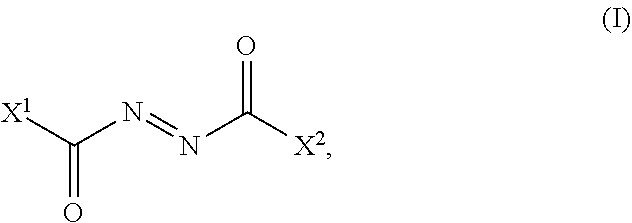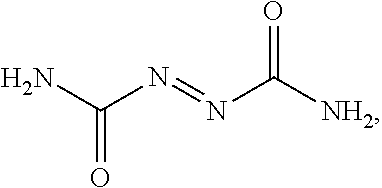Gas generating compositions
a technology of composition and gas, applied in the field of aqueous fluids containing, can solve the problems of slipping the casing into a particularly weak formation, reducing the flow rate of drilling fluid, and reducing the service life of the casing,
- Summary
- Abstract
- Description
- Claims
- Application Information
AI Technical Summary
Benefits of technology
Problems solved by technology
Method used
Image
Examples
example 1
[0293]1.5 g of azodicarbonamide solid were added to 50 milliliters of 0.8% xanthan solution and stirred vigorously for an hour to obtain a well-dispersed stable suspension. 10 ml (containing 0.3 g of azodicarbonamide) of the suspension was added to several graduated cylinders. Then, foaming surfactants and amine activators were added, as specified in Table 1. The suspension was stirred and the cylinders were kept in a water bath heated to 140° F. The initial fluid volume before measurements was 12 ml. The gas volumes were measured periodically. The results are shown in Table 1.
[0294]
TABLE 1A1B2C3D4pHE5F6G7H8Foam stabilityNone0.4Carbohydrazide 0.3 g7.0505879160Slightlyheterogeneousbubble sizes0.150.4Carbohydrazide 0.3 g—555879160Stable,homogeneousbubbles0.15NoneCarbohydrazide 0.3 g—582862 32Unstable foamNone0.4Toluene sulfonyl 0.5 g6.81212 0 0No foamsemicarbazide0.150.4Toluene sulfonyl 0.5 g—1212 0 0semicarbazide0.150.4 mlToluene sulfonyl0.45 g—324473107hydrazide0.150.4TEPA0.15 ml—33...
example 2
[0295]The results for diutan solutions are shown in Table 2. In a typical procedure, 0.5% by volume of diutan solution in water was employed. Azodicarbonamide was added with vigorous stirring, which was continued until all the solid was uniformly dispersed and suspended. In a typical experiment, 0.5 g azodicarbonamide was suspended in 10 ml of diutan solution, followed by addition of foaming surfactant (sodium lauryl sulfate, 0.4 ml), and the activator. The gas measurements were made at room temperature. The starting volume of the fluid in each experiment was 12 ml.
[0296]
TABLE 2A1B2C3D4E5F6G7DETA0.5 mln.d.,20 40 ml / 26 hrs40 56 (in 26 hrs)Carbohydrazide0.5 g1717>80 ml29>136 (in 48 hrs)NaOH (solid)0.5 g2025>80 ml52>136 (in 48 hrs)1activator2activator amount3fluid volume in 60 min, ml.4fluid volume is 100 min, ml.5final volume after 48 hours, ml (estimated)6% gas in 100 min7gas amount ml / g of azo compound at room temperature
[0297]The results of Examples 1 and 2 show that (1) organic...
PUM
| Property | Measurement | Unit |
|---|---|---|
| molar ratio | aaaaa | aaaaa |
| molar ratio | aaaaa | aaaaa |
| temperature | aaaaa | aaaaa |
Abstract
Description
Claims
Application Information
 Login to View More
Login to View More - R&D
- Intellectual Property
- Life Sciences
- Materials
- Tech Scout
- Unparalleled Data Quality
- Higher Quality Content
- 60% Fewer Hallucinations
Browse by: Latest US Patents, China's latest patents, Technical Efficacy Thesaurus, Application Domain, Technology Topic, Popular Technical Reports.
© 2025 PatSnap. All rights reserved.Legal|Privacy policy|Modern Slavery Act Transparency Statement|Sitemap|About US| Contact US: help@patsnap.com



